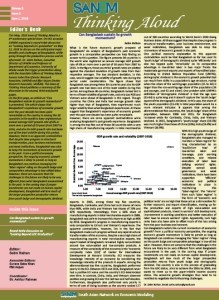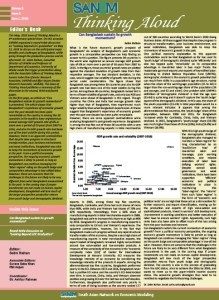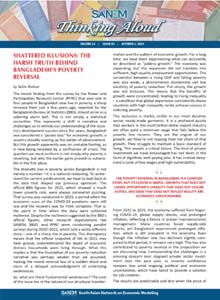
Thinking Aloud: Volume V, Issue 1
 This June 2018 issue of Thinking Aloud is a 4th-anniversary special issue. On this occasion, SANEM organized a roundtable discussion on “Looking beyond LDC graduation” on May 12, 2018 to discuss on the anticipated major benefits and challenges of Bangladesh, while going through the graduation process and its aftermath. Dr. Selim Raihan, Executive Director of SANEM and Professor at Department of Economics, University of Dhaka made the trigger presentation along with the Associate Editors of Thinking Aloud- Sunera Saba Khan (Senior Research Associate, SANEM) and Iffat Anjum (Senior Research Associate, SANEM). This issue of Thinking Aloud publishes a summary of the discussion in the second, third and fourth pages.
This June 2018 issue of Thinking Aloud is a 4th-anniversary special issue. On this occasion, SANEM organized a roundtable discussion on “Looking beyond LDC graduation” on May 12, 2018 to discuss on the anticipated major benefits and challenges of Bangladesh, while going through the graduation process and its aftermath. Dr. Selim Raihan, Executive Director of SANEM and Professor at Department of Economics, University of Dhaka made the trigger presentation along with the Associate Editors of Thinking Aloud- Sunera Saba Khan (Senior Research Associate, SANEM) and Iffat Anjum (Senior Research Associate, SANEM). This issue of Thinking Aloud publishes a summary of the discussion in the second, third and fourth pages.
On the first page, an article on “Can Bangladesh sustain its growth momentum?” is presented. The article shows that Bangladesh’s experience of economic growth over the past decade has been quite remarkable as the country is among the 30 countries in the world to have registered an annual average GDP growth rate of 6% or more over a period of 10 years from 2007 to 2016, and also its GDP growth rate had been one of the least volatile during this period. However, there is an apparent contradiction that despite slow progress in structural transformation, poor business environment, and weak institutions, Bangladesh was able to keep the momentum of economic growth in the past. From a political economy perspective, the ongoing economic growth momentum is likely to persist as long as Bangladesh can continue managing the ‘labor regime’ riding on the youth bulge and comparative advantage in low-skilled labor. However, there are concerns that the challenges in the future are likely to be very different from what Bangladesh encountered in the past. In the coming days, if proper investments are not made on human capital development, Bangladesh will lose much of the larger prospective productive returns from youth bulge and demographic dividend.
Tag: growth momentum, demographic dividend, comparative advantage



